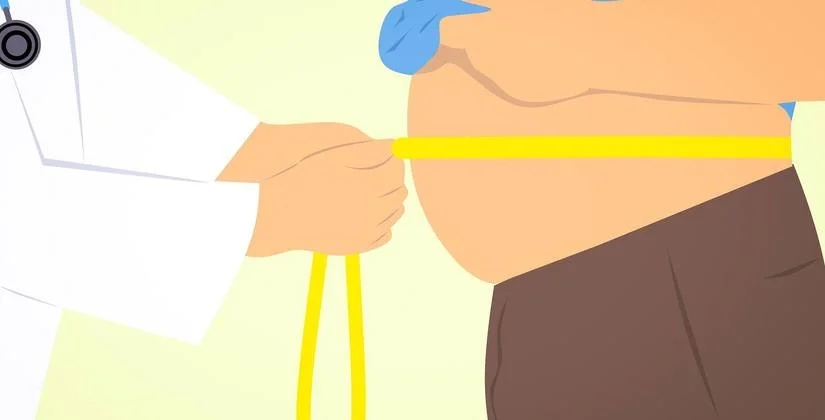Лечение на наднормено тегло: В тази кратка статия, екипът ни ще се постарае да Ви даде някой от най-полезните съвети за справяне с наднормено тегло.
Постарали сме се в три важни точки да обобщим техници за справяне с излишното тегло
1. Лечение на наднормено тегло посредством промяна в хранителните навици
Промяната в хранителните навици е първата стъпка в битката с килограмите. Обикновено то се изразява в елиминиране на вредните и силно преработени храни и напитки, с полезни, изцяло натурални такива. Тази промяна има няколко важни ползи, които са:
- – натуралните храни, за разлика от преработените, са богати на важни микро-нутриенти. А тялото ни има нужда от тях за правилната си функция и поддържането на бърз метаболизъм.
- – естествените храни имат по-малко количество калории в единица обем, като по този начин е много по-лесно да се придъжате към ниско-калориина диета, което е важно за лечението на наднормено тегло.
- – естествените храни не съдържат вредни химикали, подобрители, овкусители и консерванти. Това ги прави много по-здравословен за тялото ни избор.
Диетичните промени за лечение на наднормено тегло включват:
- Намаляване на калории. Ключът към загубата на тегло е намаляването на броя на калориите, които приемате. Вие можете да прегледате обичайните си навици за хранене и напитки, за да видите колко калории обикновено консумирате. Оттам и къде можете да ги намалите. Стандартния прием е 1200 до 1500 калории за жените и 1500 до 1800 при мъжете.
- Чувствайте се сити с по-малко. Концепцията за енергийната стойност може да ви помогне да задоволите глада си с по-малко калории. Всички храни имат определен брой калории. Някои храни – като десерти, бонбони, мазнини и преработени храни са с висока енергийна стойност. Това означава, че малък обем от тази храна има голям брой калории. За разлика от това, други храни, като плодове и зеленчуци, имат по-ниска енергийна стойност. Тези храни осигуряват по-голям размер на порцията с по-малко калории. Чрез яденето на по-големи количества храни, които имат по-малко калории, намалявате усещането си за глад, приемате по-малко калории и се чувствате по-добре, което допринася за удовлетворението, което чувствате като цяло.
- Отслабвайте здравословно. За да направите цялостната си диета по-здравословна, яжте повече растителни храни, като плодове, зеленчуци и въглехидрати, пълнозърнест хляб. Също така подчертаваме постните източници на протеин – като боб, леща и соя. Ако харесвате рибата, опитайте да я включите два пъти седмично. Ограничете солта и добавената захар. Придържайте се с нискомаслени млечни продукти. Яжте малки количества мазнини и се уверете, че идват от източници, които се грижат и за вашето сърце, като маслини, рапично масло и маслени орехи.
- Ограничаване на определени храни. Някои диети ограничават количеството на определена група храни, като храни с високо съдържание на въглехидрати или пълномаслени храни. Посъветвайте се с Вашия лекар кои храни биха били най- ефективни за вас. Пиенето на подсладени напитки например е сигурен начин да се консумират повече калории, отколкото сте възнамерявали. Ограничаването на тези напитки или елиминирането им като цяло, е добър начин за започване на намаляването на калории.
Бъдете предпазливи относно бързите резултати при справяне с наднормено тегло
Може да бъдете изкушени от диети, които обещават бърза и лесна загуба на тегло. Реалността обаче е, че няма магически храни. Модерните диети могат да помогнат в краткосрочен план, но ние търсим друг ефект. За да отслабнете и да задържите резултата, трябва да придобиете здравословни хранителни навици, които да поддържате с течение на времето.
2. Лечение на наднормено тегло посредством спорт
Лечението на наднормено тегло посредством спорт има свойте допълнителни ползи и дори при някой хора е първият метод, който се използва. Спортът има много ползи, като най-важните и основни са:
– спортът генерира голям калориен разход, независимо от това какво сте избрали да спортувате. По този начин, тялото ни изгаря допълнителен брой калории всеки ден, а това е основна предпоставка за загуба на излишните килограми.
– спортът укрепва мускулатурата и опорно двигателни апарат и оптимизира метаболизма, което повишава разхода на калории, дори когато не спортувате, както и подобрява цялостната преработка на хранителните вещества в насока изгаряне на излишните мазнини.
– спортът подобрява координацията и подобрява психичното здраве, което влиае на мотивацията и желанието за постигане на цели.
Правете упражнения
Хората с наднормено тегло или със затлъстяване трябва да получат поне 150 минути седмично физическа активност с умерена интензивност. Така ще предотвратят по-нататъшно увеличаване на теглото или да запазят постигнатия резултат. За да увеличите загубата на тегло, може да се наложи да упражнявате 300 минути или повече на седмица. Вероятно ще трябва постепенно да удължите времето, което отделяте за спортуване, тъй като вашата издръжливост ще се подобрява.
Продължавайте да се движите.
Въпреки че редовните аеробни упражнения са най-ефикасният начин да изгорите калории и да отделите наднормено тегло, всяко допълнително движение спомага за изгарянето на калории. Провеждането на прости промени през целия ден може да доведе до големи ползи. Паркирайте по-далеч от входа на магазините, преподредете дома си или градината. Станете и се движете периодично и носете крачкомер, за да проследите колко стъпки действително поемате в течение на един ден.
3. Справяне с наднормено тегло посредством комбинация от хранителни навици и спорт
Това безспорно е най-добрият подход, защото обединява ползите от добрите хранителни и добрите двигателни навици. В допълнение с правилни хапчета за отслабване, ефектът няма да закъснее.
Лечението на наднормено тегло, посредством комбинацията от спорт и добра храна, ще Ви позволи да постигнете целите си максимално бързо и най-важното по най-правилния за тялото ни начин, което ще Ви гарантира и дълготрайни резултати.
Намаляването на калориите и практикуването на по-здравословни хранителни навици са от жизненоважно значение за преодоляване на затлъстяването. Въпреки че може да отслабнете бързо, бавната и постоянна загуба на тегло в дългосрочен план се счита за най-безопасният и добър начин да го запазите за винаги.
Избягвайте драстични и нереалистични промени в диетата, защото те едва ли ще ви помогнат в дългосрочен план. Планирайте да участвате в цялостна програма за отслабване за най-малко шест или година, за да увеличите шансовете си за успех в загубата на тегло.
Още за наднорменото тегло
Често наднорменото тегло се свързва с ниското самочувствие, дискомфорт при социални контакти, особено с хора от срещуположният пол. Много хора с наднормено тегло умишлено избягват посещение на места, на които облеклото е по-оскъдно – плажове, басейни, спортни площадки. Това неимоверно нанася голям удар по самочувствието, води до проблеми в комуникацията, нарушава се социалният живот и т.н.
Причините за наднорменото тегло могат да бъдат различни – от хормонален дисбаланс, причинен от различни заболявания, до чисто и просто прекаляване с храната и обездвижване. Много често всичко започва с 2-3 безобидни килограма, на които не се обръща внимание до момента в който не станат 10-15 и започнат да пречат на нормалният ни ритъм на живот.
Освен чисто естетичната страна на нещата, много по-значително и опасно е влиянито на излишните килограми върху здравето ни.
Повишеното тегло води след себе си редица негативи за здравето – повишено кръвно налягане, намалена трудоспособност, намалена подвижност, развитие на редица проблеми със щитовдната жлеза и сърцето. Тежестта на тялото оказва натиск върху костите, ставите и кръвоносните съдове. Болки в глезените, коленете, разширени вени, са част от „бонусите“ , които получаваме от излишните си килограми.
Натрупване на шлаки и мазнини по органите ни, повишава риска от инфаркти и инсулти. Омазняването на органите и натрупването на висцерална мазнина по корема, може да бъде причина за затруднено изхождане, натрупване на твърда фекална маса в червата ни и загниване, което е гаранция за възпаления и редица заболявания.
Първата стъпка към промяната е осъзнаването на проблема и промяна на посоката в която се движим. Нашето тяло е най-ценната инвестиция, която можем да направим, ако искаме да се радваме на добро здраве и добра работоспособност и в напреднала възраст.
Правилно хранене, движение и позитивни емоции са трите най-важни стъпки към промяната.
Лечение при наднормено тегло и затлъстяване
Наднорменото тегло е характерно за няколко състояния на човешкия организъм. Една значителна част се заема от неправилното, неконтролирано хранене. Затлъстяването се счита за патологично състояние, характеризиращо се с натрупване на прекомерно количество мастна тъкан. Наблюдава се увеличаване размера на мастните клетки.
Наднорменото тегло и затлъстяването е резултат на нарушен енергиен баланс. В зависимост от степента на натрупване на мастната тъкан, състоянията се характеризират като наднормено тегло или затлъстяване.
Затлъстяването се счита за медицинско състояние, криещо много рискове за здравето. Повишен риск от сърдечни заболявания е една от най-значителните опасности. Не по-малка е вредата за психическото състояние на човека. Наднорменото тегло и затлъстяването водят до значително намалено самочувствие, дори цялостна липса на такова, ограничаване на социалните контакти и самоизолация, самоубийствени мисли и т.н.
Какви могат да бъдат основните причини:
- Системна злоупотреба с храна
- Нарушен хормонален баланс
- Генетични фактори – при наличие на дори един родител с такъв проблем вероятността да се придаде на детето е близо 40%
- Психологически фактори
Методите за лечение са различни и се определят според типа и причината за това състояние. Основните начини за лечение са:
- Диетолечение
- Повишаване на двигателната активност
- Психологическо лечение или поведенческа терапия
- Медикаментозно лечение
- Хирургична намеса при най-сериозните състояния
За превенция и регулиране на теглото, спазвайте следните правила:
- Хранете се балансирано и следете калороийния баланс – приемайте по-малко, от колкото изразходвате
- Набляагайте на пълноценна храна, съставена от зеленчуци, протеини, бавни въглехидрати и плодове
- Ограничете до минимум приема на тестени и захарни изделия
- Приемайте голямо количество течности – за предпочитане вода, без подсладени напитки
- Увеличете двигателната си активност
Вижте и продукт за отслабване Редуктил ТУК!


